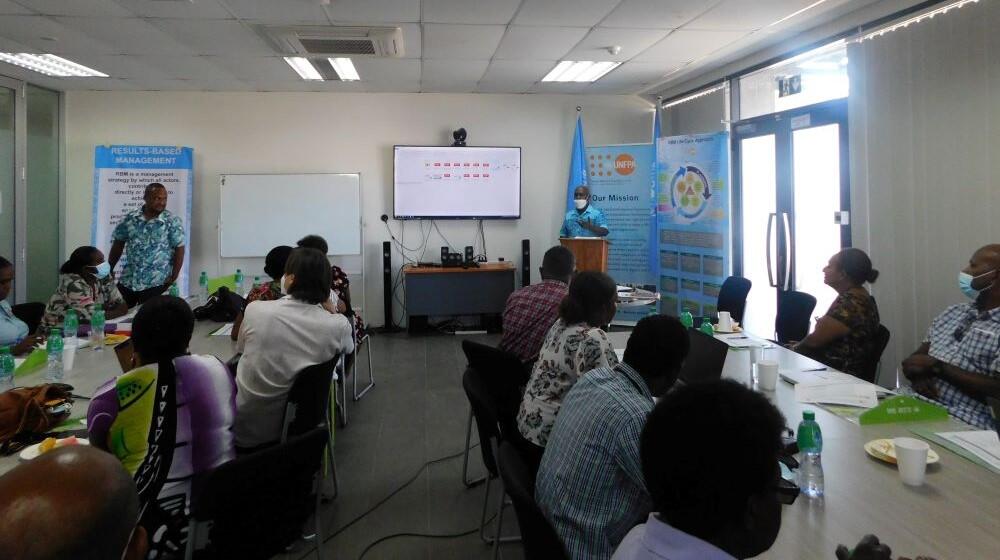Honiara, SOLOMON ISLANDS – “The training was really helpful in refreshing my understanding as to how important results-based management (RBM) including monitoring and evaluation (M&E) is for government officials like us,” recollected a participant who completed a RBM-training organized by the United Nations Population Fund (UNFPA) Pacific in Honiara from 23-25 August 2022, adding that “RBM needs to be applied throughout all the phases from planning to implementing, monitoring and results-reporting on any progamme, project, or policy implementation, regardless of its thematic focus area.”
This RBM training was facilitated by UNFPA Pacific Sub-Regional Office (Fiji) Monitoring and Evaluation team, held at the United Nation Joint Programme Office in Honiara, with funding support from the Australian Government Department of Foreign Affairs and Trade (DFAT). As part of UNFPA’s global efforts at assisting Member States in accelerating their efforts toward three ambitious, people-centered “Transformative Results” by 2030 – Zero unmet need for family planning, Zero preventable maternal deaths, and Zero gender-based violence – UNFPA Pacific has been rolling out RBM training in the sub-region, shifting a focus more on adaptive learning, while renewing a collective sense of urgency towards 2030. This was the first of its kind for a cohort of UNFPA Pacific’s Implementing Partners in the Solomon Islands, while similar trainings have benefitted UNFPA’s partners in Fiji, Tonga, Samoa, Kiribati and Vanuatu since 2020.
The workshop in Solomon Islands was organized in partnership with the Ministry of Health and Medical Services (MHMS), and combined learning about the latest RBM theory, and practical applications of the concept to the day-to-day programme/project management. National and sub-national sexual reproductive health (SRH) coordinators, health managers, along with other line ministries including the Ministry of Education and Human Resource Development, planning and policy officials, NGO partners such as the Solomon Islands Planned Parenthood Association, and other representatives from UNFPA’s Implementing Partners joined the workshop, and learned how to more effectively manage and coordinate integrated services, collect, report, analyse, and use data to track progress against targets set.
“The Ministry of Health and Medical Services’ strong partnership with UNFPA for this training was a reflection of the Ministry’s renewed commitment to RBM that is stemmed from the need to track progress of our country’s health indicators, particularly related to women’s and young girl’s health,” said Mr. Ivan Ghemu, Director for Planning and Policy Division, MHMS.
Permanent Secretary of the MHMS, Ms. Pauline McNeil, advised that applying the latest RBM concepts and principles will benefit the ministry’s ongoing work on developing a new 10-year MHMS Strategic Plan 2022-31. “There is a demand in the MHMS in particular and the whole government in general for sound and holistic understanding of RBM principles with which to guide planning, budgeting, implementation, monitoring and evaluation processes.”
According to Mosese Qasenivalu, Head of Monitoring and Evaluation Unit of UNFPA Pacific, RBM in sustainable development context refers to a management strategy by which all actors make sure that all processes of planning, budgeting and delivery of products and services are done with a view to contributing to the achievement of desired results (outputs, outcomes, and higher-level goals or impact) as part of national/local development strategies and plans. The actors monitor the progress, use information and evidence gained in results-reporting, and in turn use them to inform decision making on the design, resourcing and delivery of programmes and activities, thus reinforcing ownership and mutual accountability.
“Also, the elements of mutual learning, reflection and adaptive management in the RBM model are important in the collective pursuit of development results. Also, it is important to build in adequate budget and staffing for RBM/M&E in any project/programme – these were additional key take-aways from UNFPA’s RBM training,” another participant shared.


